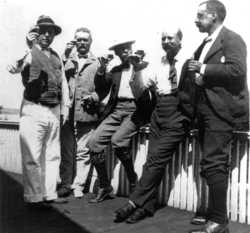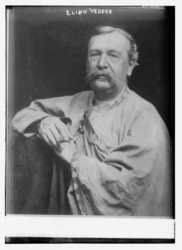
Don't drink the vanilla, Lumber camp, ca. 1910
Maine Historical Society
Don't Drink the Vanilla
Isaac Simpson (1874-1957), Amity, Maine
Photograph, ca. 1920
Collections of Maine Historical Society, gift of Geraldine Tidd Scott
Isaac Simpson made hundreds of photographs of logging crews and rural Mainers. Drinking was enjoyed by cutting crews and sportspeople in the big woods in spite of Prohibition laws. Vanilla, with an alcoholic content, was imbibed by the truly desperate.

Bird's eye view of National Soldier's Home, Togus near Augusta, 1878
Osher Map Library and Smith Center for Cartographic Education
National Soldier Home: Birds Eye View of Togus
Beck and Pauli, Lithographers, 1878
Lithograph
Collections of Maine Historical Society
As a Federal installation located in Augusta, Togus became an oasis in an increasingly dry state. At one point a shipment of liquor was seized by state authorities. Occasional off-campus antics caused friction as well, for as the Old Soldiers Refrain boasts, "But if we get too tipsy on prohibition gin, the police, always ready, the guard-house runs us in."
Three Lads Drinking
H. P. Poisson, Biddeford, ca. 1910-1915
Postcard
Collections of Maine Historical Society
The Red Lane
Holman Francis Day (1865-1935)
Collections of Maine Historical Society
813 D331r
Maine adventure writer Holman Day set this novel against the backdrop of liquor smuggling among the Acadian border population in Aroostook County. An earlier book, The Ramrodders, 1910, satirized Maine politicians and Prohibition.
Tradecards: A.D. & C. Cos Sarsaparilla, Auburn Drug and Chemical Co., Lydia E. Pinkhams Vegetable Compound, Hoods Sarsaparilla
Collections of Maine Historical Society
Coll. S-5665
By the late 19th century, tonics and patent medicines such as these were popular cure-alls, especially with women. Many of the mixtures were alcohol-based.
Wine Press
Kendall & Whitney, Portland, early 20th century
Courtesy of Doris Stockly
This press belonged to Antonio Potenza (1891-1976) a native of Viesta, Italy who emigrated to Portland around 1916 and established a barber shop on Middle Street. Wine was a staple in Italian families and at least one Portland priest viewed Prohibition as an evil.
Dr. Charles G. Weld's North Haven cottage
Ca. 1900
Courtesy of the Pingree Family and Maine Historic Preservation Commission
From the 1870s onward, summer residents changed the complexion of coastal and rural life. Local law enforcers rarely bothered these wealthy and educated visitors.

Henry Wadsworth Longfellow, Craigie House, Cambridge, 1881
NPS, Longfellow House-Washington's Headquarters National Historic Site
Henry Wadsworth Longfellow (1807-1882)
Ca. 1875
Collections of Maine Historical Society; gift of Gertrude Ford, 1996
Not all Mainers in the middle and upper classes opposed drinking. Portland-born Longfellow, a Bowdoin College graduate, was world famous for his poetry. Though not an abuser of ardent spirits, Longfellow frowned on the more fanatic Temperance leaders. One of his last letters was to his wine merchant, thanking him for sending him a case of delicious wine. Longfellow lived in Cambridge, Massachusetts by then; had he lived in his family home in Portland, his order would have been illegal.
Illustrations from Bunker's Text Book of Political Deviltry,
With Jack-Knife Illustrations: Maine's Small-Bore Politicians and Facts About Temperance Hypocrites
Benjamin F. Bunker, Waterville, 1889
Collections of Maine Historical Society
S.C. 3
The Bugle
Bowdoin College, 1881
Collections of Maine Historical Society
378 B674Q-b

Athian Lewey, West Grand Lake, 1898
Maine Historical Society
Atbian Lewey at Grand Lake, Maine
Jim M'Kin, 1898
Photograph
Collections of Maine Historical Society
Maine's Native Americans were noted for their skill as guides. The addition of a jug (probably the photographer's prop), suggests the stereotype of drinking.
Portland, Maine. Seeing Congress Square Lit Up
ca. 1890s
Postcard
Collections of Maine Historical Society
By the turn of the century, postcards poking fun of Maine's dry status were popular items.
Collected Poems of Edward Arlington Robinson
The MacMillan Company, 1929
Courtesy of William and Debra Barry
Collections of Maine Historical Society, B R561edc
Robinson (1869-1935) was born at Headtide, Maine and gradually rose to the status of one of Americas best-known poets. Calling him "the poet of hopeless hope," author David Newlove wrote, "For him, alcohol was death around the clock. Worse a half-death in grey light."
Conduskeag Canoe Club Program
1903
Collections of Maine Historical Society
Pamphlet 5711
Together with the Irish, Native Americans were perceived to be problem drinkers. This local cartoon shows the stereotype.
A New Yorkers Visit to Maine
Cartoon in Puck magazine, 1886
Courtesy of Arlene Palmer Schwind
This cartoon satirizes many people's approach to Maine's dry laws.
Elihu Vedder (1836-1923)
Courtesy of William David Barry
Vedder was a bold drinking man who came to install his mural, Rome, at the Walker Art Gallery at Bowdoin College in 1894. "In Maine I suffered much from thirst," he wrote until a waitress in his hotel told him about, or rather hinted about, a gin-mill in nearby Robinhood, "I must say, regarding the thirst, that it arose entirely from my ignorance in regard to the handling of the ropes."
Bunker's Text Book of Political Deviltry, With Jack-Knife Illustrations: Maine's Small-Bore Politicians and Facts About Temperance Hypocrites
Benjamin F. Bunker, Waterville, 1889
Collections of Maine Historical Society
S.C. 3
Waterville publisher and satirist Benjamin Bunker has left us with a rich views of the 19th century political landscape in his illustrated textbook. The same pages offer a drinkers tour of Maine, showing how major communities enforced or failed to enforce liquor laws. Bunker found Bangor "the one place east of Boston where you can enter a gilded saloon and get an honest drink of pure liquor." Meanwhile, Portland claimed to be dry but had more than 100 kitchen bars.















